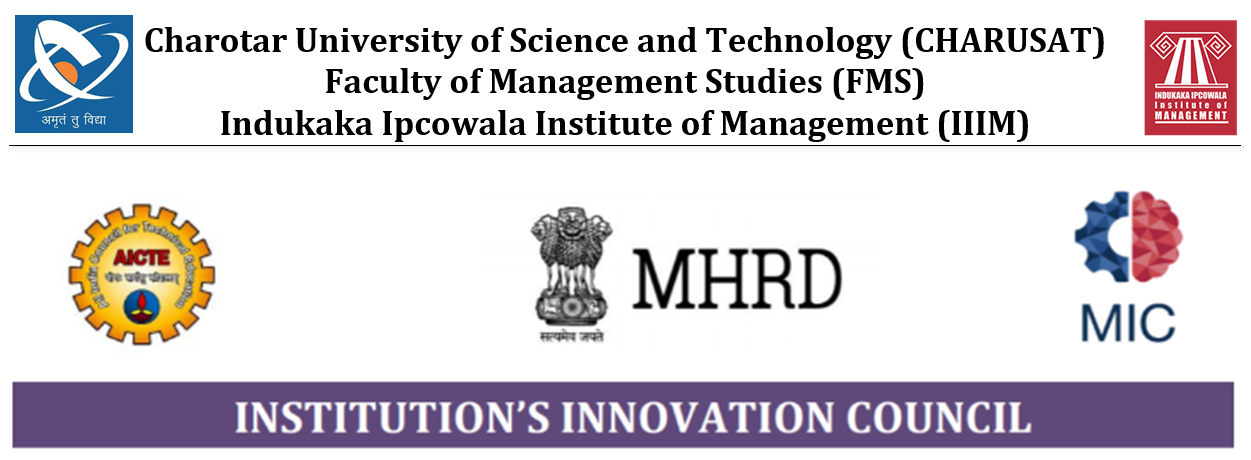
National innovation and start-up policy (NISP) under the aegis of the Ministry of Education’s Innovation Cell (MIC). The policy aims at promoting innovation and start-up culture among the students and faculty of Higher Educational Institutes.
Ministry of Human Resource Development (MHRD) is addressing the challenges of building and streamlining innovation and entrepreneurship ecosystem in Higher Educational Institutions (HEIs) by setting up an Innovation Cell (MHRD’s Innovation Cell in short MIC) at All India Council for Technical Education (AICTE), New Delhi. Major programs being implemented by MHRD’s Innovation Cell and AICTE are Smart India Hackathon, National Student Start-up Policy, Atal Ranking of Institutions on Innovation Achievement (ARIIA) and Setting up Institutions Innovation Councils (IICs) in HEIs.
Institutions Innovation Council (IIC) at institute is a unique model based on Hub-Spoke and coherence approach to align with the innovation and entrepreneurship promotion and support programs are being organized by various departments and ensures round the year activities in campus for effective engagement, learning and practicing innovation and entrepreneurship among student and faculty community. Ideally, Institution Innovation Council is a faculty led but student centric body formed by the institute with active representation of entrepreneurial faculties, students and expert’s representations from regional ecosystem enablers, pre-incubation and incubation centres within and outside the institute and work in synergy manner towards to provide platform to encourage, inspire and nurture young students by exposing them to new ideas and process of resulting in innovative activities & entrepreneurial in their formative years.
MIC has envisioned encouraging creation of ‘Institution’s Innovation Council (IICs)’ across selected HEIs. A network of these IICs will be established to promote innovation in the Institution through multitudinous modes leading to an innovation promotion eco-system in the campuses. Institution Innovation Council plays an instrumental role in building and streamlining innovation and start-up ecosystem at institutional level. The operational model of IIC has inbuilt incentive system of measurement, rating, promoting and rewarding of best performing IICs and innovations coming out of IICs efforts to promote healthy competitions among institutions to build a strong and vibrant innovation and start-up ecosystem in campus.
The IIC cell meets once per quarter to organize quarterly activities and evaluate those that have previously been done. As a result of these activities, students may be able to participate in MHRD's various innovative initiatives and competitions. On a regular basis, students meet with prominent businesses and professors. They are given the opportunity to expand on their concepts. IIIM-IIC aids students in developing a prototype using cutting-edge technologies in order to gain confidence. Students are engaged in a particularly healthy environment, from inspiration to start-ups.
These aims can be met by providing venues for students to initiate student entrepreneurial activities, initiating occasions for students to work with small and medium-sized businesses/organizations, creating awareness of the resources that support the creation of businesses/ventures, within the institution, providing opportunities for students to generate business/venture ideas, offering opportunity for students to acquire the knowledge to start a venture, providing students access to business courses and initiating occasions for students to learn about various types of entrepreneurship.
The Entrepreneurship Policy Framework focuses specifically on policies aimed at promoting the emergence of new student and alumni entrepreneurs and facilitating new business start-ups. Given this focus, the framework also pays attention to how this entrepreneurship policy interacts with a broader climate. The ultimate focus, internally, is to increase students’ likelihood of becoming entrepreneurs (business, social, or inventors/innovators) at some point, either while pursuing their education or after completing it. Additionally, taking business courses and having the knowledge to start a business/venture contribute to a higher likelihood of engaging in certain types of entrepreneurship (business and inventing/innovating).
The overall focus of the policy framework is to identify needs and developmental opportunities and attend to the gaps in entrepreneurship education, awareness, and advocacy. This is used to increase entrepreneurial behaviours and activities in students, alumni and faculty, with specific aims.
| Sr. No. | Particulars |
|---|---|
| 1 | National Innovations and Start-up Policy (NISP) |
| 2 | Student Startup and Innovation Policy (SSIP 2.0) |
| 3 | Student Innovation and Startup Index (SISI) |
| 4 | Nomination of NISP Coordinator |
| 5 | CHARUSAT - IIIM- IIC - Innovation and Entrepreneurship Policy |
| 6 |
|
| Sr. No. | Particulars |
|---|---|
| 1 | The NISP Team |
| 2 | Roles of Implementation Team |
| 3 | Key Performance Indicators |
| 4 | Action Plan |
| 5 |
Detailed Reports of the Events |
| 6 |
Minutes of the Meetings |
| 7 | Upcoming Programmes / Activities / Opportunities Section |
Welcome to our Website. We are glad to have you around.